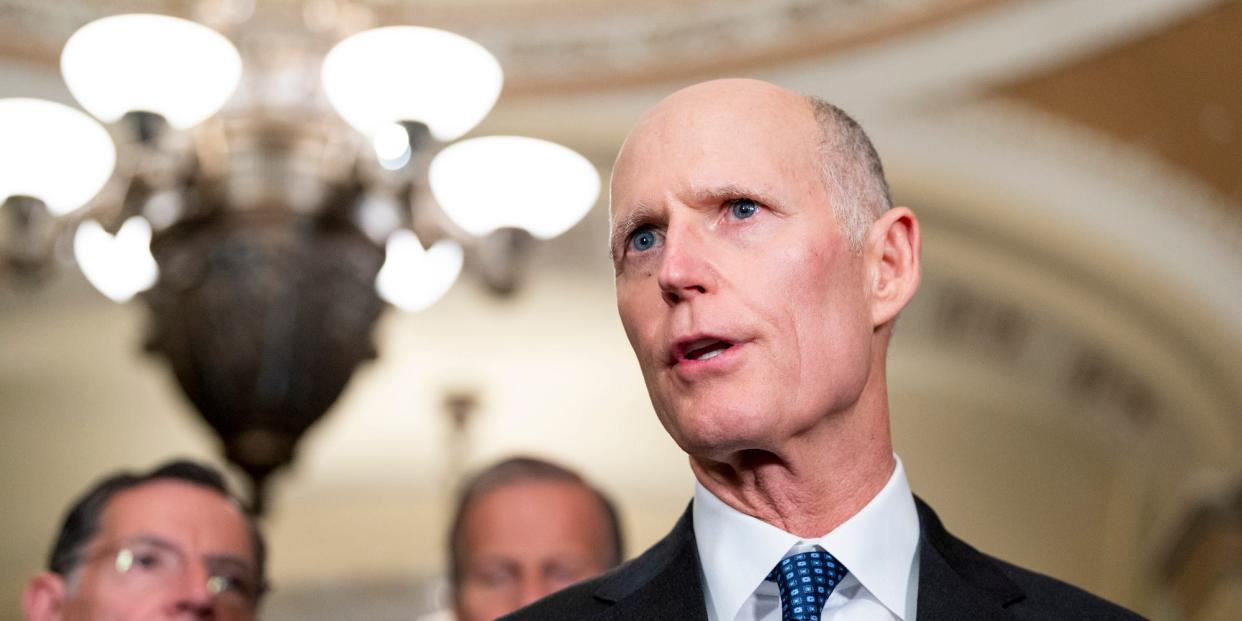Rick Scott says Republicans 'live in fear of speaking the truth' in defiant op-ed after Mitch McConnell shut down his tax-raising 11-point plan

Mitch McConnell publicly shot down Rick Scott's 11-point GOP agenda at his news conference on Tuesday.
Scott's plan would raise taxes on millions of Americans, and Democrats have seized on it as an opportunity.
But Scott remains defiant, and wrote a Wall Street Journal op-ed doubling down on the plan.
Republican Sen. Rick Scott of Florida is doubling down on his 11-point "Rescue America" plan even after Senate Minority Leader Mitch McConnell publicly smacked down one of its key proposals on Tuesday.
In a Wall Street Journal op-ed entitled "Why I'm Defying Beltway Cowardice" published Thursday evening, Scott argued that Republicans have an obligation to put forward an affirmative agenda and suggested most of his colleagues were on his side, despite him committing "heresy in Washington."
"If we have no bigger plan than to be a speed bump on the road to socialism, we don't deserve to govern," wrote Scott. "Most Republicans in Congress agree, but many live in fear of speaking the truth in Washington."
Scott's plan, in addition to calling for the US-Mexico border wall to be finished and named after former President Donald Trump, calls for all Americans to pay some form of income tax. That would be a de-facto tax hike for millions of Americans that do not currently pay the tax because they either earn too little to have any tax liability or are out of the workforce.
On Tuesday, when McConnell was asked about the plan at his weekly press conference, he made clear that he was not on board with Scott's ideas.
"If we're fortunate enough to have the majority next year, I'll be the majority leader," he said. "And let me tell you what would not be part of our agenda. We will not have as part of our agenda a bill that raises taxes on half the American people."
—CSPAN (@cspan) March 1, 2022
McConnell has long resisted releasing an affirmative agenda for the party, believing that its best to make midterm elections a referendum on the president's job performance.
Politico also reported that McConnell rebuked Scott behind closed doors in a GOP leadership meeting that lasted nearly an hour. Democrats have seized on the plan as potential fodder for attack ads ahead of the midterm elections this year, and the fallout of Scott's move revealed the lack of a broader Republican economic plan.
The tension between Scott and McConnell is particularly notable given that they both occupy leadership positions within the Senate Republican caucus. Scott chairs the National Republican Senatorial Committee, the organization in charge of steering the party through the upcoming midterm elections and retaking the chamber for Republicans. Scott has sought to clarify that the plan is his alone and doesn't represent the views of the NRSC.
In his op-ed, the Florida Republican said that the "militant left" wants to "end the American experiment and replace it with a woke socialist utopia," while taking aim at "free-loaders who abuse the welfare system" as well as billionaires who don't pay taxes.
The Tax Policy Center modeled a hypothetical version of Scott's tax plan with a $100 minimum tax. Middle and low-income families would bear the brunt of the tax hikes, the organization said.
"You can't tell the public that Social Security and Medicare are going bankrupt. You can't talk about term limits, because, while voters want them, nobody in Washington does," he wrote. "You can't talk about balancing the budget or shrinking the debt."
Social Security and Medicare are two of the largest federal programs providing financial and health benefits for seniors. For many years, Republicans pushed to cut the national debt by reining in their rising spending. But President Donald Trump largely turned the party away from those efforts by vowing leave them untouched — and pitching at one point that some low-income Americans don't need to pay income tax at all.
"So, I went out and made a statement that got me in trouble. I said that all Americans need to have some skin in the game. Even if it is just a few bucks, everyone needs to know what it is like to pay some taxes. It hit a nerve," he continued. "Part of the deception is achieved by disconnecting so many Americans from taxation. It's a genius political move. And it is bankrupting us."
Read the original article on Business Insider

